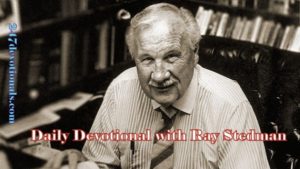Table of Contents
Topic:A Poor but Good Prayer
A daily devotion for June 20th
Read the Scripture: Numbers 11:4-34
He (Moses) asked the Lord, Why have you brought this trouble on your servant? What have I done to displease you that you put the burden of all these people on me? Did I conceive all these people? Did I give them birth? Why do you tell me to carry them in my arms, as a nurse carries an infant, to the land you promised on oath to their ancestors? Where can I get meat for all these people? They keep wailing to me, Give us meat to eat! I cannot carry all these people by myself; the burden is too heavy for me. (Num 11:11-14)

It is obvious that this prayer is filled with a great deal of self-pity, reproach, and petulance. It is the expression of a man who feels he had been put upon. Moses comes very close to rebuking and upbraiding God for ever giving him the job of taking care of these ungrateful people. This is one of the poorest prayers in the Bible, but it is a prayer that is very like ours.
Moses had an extremely rich prayer life. His prayers are uttered with an artless eloquence which gathers up majestic thoughts about the greatness of God, which reflect man’s faith and God’s power to act, but this is surely not one of them. This is a very weak prayer, uttered at a time when Moses felt that he had been taken advantage of. He wanted to quit, so he lays it all before God, and says, Why ever did you give me a job like this? Where am I to get meat to give to all these people? Why should I bear them on my heart? I didn’t bring them into being.
We do not get this picture of Moses very often. He was a towering figure in the Old Testament, a mighty prophet and leader of the people. He affected the laws of nations for thousands of years, therefore we tend to think of him as high above all of us in his relationship to God. We are familiar with the stories of Moses exercising the mighty power of God — stretching out his rod to roll back the waters of the Red Sea so that the people of Israel walked through on dry land, striking the rock so the waters flowed out in the midst of a howling desert to slake the thirst of the people. It is clear from many of these stories in the Bible that he was a mighty man of God.
But here in this prayer we get the other side of Moses. In this and other accounts like this we get glimpses now and then of Moses as he lived his daily life, and the amazing thing is that, when we get close to him, we see that he is a surprisingly unimpressive figure in himself. Here we see him angry and upset and feeling sorry for himself. There is nothing heroic about him at all. Moses is, by natural temperament, an irresolute, shrinking personality, distrustful of self, easily discouraged, ready to resign and even die when the pressure is heavy. This is the human instrument used so mightily by God.
The remarkable thing about this is that even this self-pitying reproachful request of Moses was answered. It is the poorest prayer he ever prayed, far from a model of prayer, but, whatever else it was, this prayer was an attempt to draw upon divine resources. It recognized Moses’ own personal insufficiency, and it had an awareness of the incredible resources of God; therefore God honored it and answered it. That is what prayer is, a reliance on God, which brings forth great possibilities.
Lord, I confess I often feel like Moses. I feel like my problems are too big for me, my circumstances are too complex for me to work out, and I resent being asked to do so. Forgive me Lord. Teach me that you are a God of infinite resources, of incredible wisdom, of infinite patience, and that you work out these matters if I but trust.
Life Application: Are we quick to blame God for life’s problems, but slow to accept his ways and means to their solutions? Could this indicate misplaced confidence in ourselves, rather than confident expectation in God and his will?
We hope you were blessed by this daily devotion.
